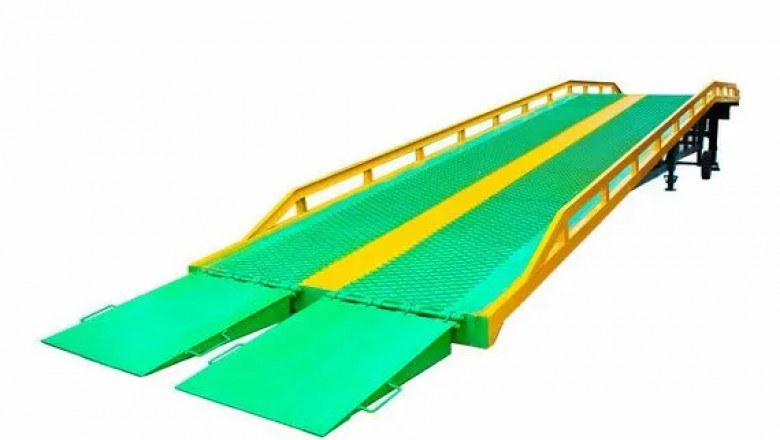views
A mini dock leveler is an essential piece of equipment for many warehouses, small loading docks, and distribution centers where space constraints require compact yet efficient solutions. These devices bridge the gap between a loading dock and a truck bed, allowing smooth transfer of goods and minimizing downtime during loading and unloading processes. Given their crucial role, maintaining your mini dock leveler properly is vital to ensure its longevity, reliability, and safety.
In this article, we will explore practical and effective tips to maintain your mini dock leveler. We will discuss the importance of regular inspections, cleaning, lubrication, and proper usage, all aimed at extending the life and optimizing the performance of this indispensable equipment.
Understanding the Importance of Mini Dock Leveler Maintenance
Mini dock levelers are subjected to constant mechanical stress. They support the weight of heavy equipment like forklifts and pallets loaded with goods, which makes them prone to wear and tear. Failure to maintain them can lead to operational breakdowns, increased repair costs, and safety hazards.
A well-maintained dock leveler not only functions smoothly but also reduces the risk of accidents caused by malfunctioning equipment. Moreover, proper maintenance helps companies avoid costly downtime that can disrupt supply chain timelines and affect overall productivity.
Routine Inspection: The First Step Toward Longevity
One of the most critical aspects of maintaining a mini dock leveler is conducting routine inspections. These should be scheduled regularly, ideally monthly or based on usage frequency. Inspections focus on detecting early signs of damage or malfunction, such as cracks, worn-out parts, or hydraulic leaks.
During inspections, operators or maintenance personnel should check the platform surface, hinges, lip mechanism, and all moving parts. Attention should be given to any unusual noises during operation, as these often signal underlying issues. Early detection allows for timely repairs and prevents minor problems from escalating into major failures.
Cleaning: Keeping the Dock Leveler Free from Debris
Keeping your mini dock leveler clean is essential for maintaining its operational efficiency. Dirt, dust, and debris accumulation can cause moving parts to stick or wear prematurely. For example, debris caught in the hinge mechanism can prevent the dock leveler from opening or closing smoothly, affecting the loading process.
Cleaning should involve removing dirt and foreign objects from all accessible parts, including the platform, lip, and hinges. Use a brush or compressed air to clean hard-to-reach areas. Additionally, ensure the surrounding dock area is kept clean to prevent debris from interfering with the equipment.
Lubrication: Ensuring Smooth Movement
Lubrication plays a key role in minimizing friction and wear on the moving components of a mini dock leveler. Applying the right lubricant to the hinges, pins, and other moving parts reduces the effort required to operate the leveler and extends the life of mechanical components.
It’s important to follow the manufacturer’s recommendations for lubrication frequency and type. Using inappropriate lubricants or skipping lubrication altogether can lead to premature wear, corrosion, and even equipment failure. Regular lubrication helps maintain smooth operation and prevents unexpected breakdowns.
Hydraulic System Care: Vital for Powered Mini Dock Levelers
Many mini dock levelers use hydraulic systems for easier lifting and lowering of the platform. Proper care of this hydraulic system is crucial for maintaining performance and preventing costly repairs.
Check hydraulic fluid levels regularly and top up if necessary, using the correct fluid type specified for the equipment. Inspect hydraulic hoses and cylinders for leaks or damage, which can compromise system efficiency. Address any signs of hydraulic malfunction immediately to avoid further damage.
Moreover, avoid exposing hydraulic components to extreme temperatures or contaminants, as these can degrade seals and fluid quality. A well-maintained hydraulic system ensures smooth, reliable operation and reduces operator fatigue.
Proper Usage: Extending Equipment Life through Careful Operation
Even the best-maintained mini dock leveler can suffer damage from improper use. Operators should be trained on the correct procedures for using the dock leveler safely and efficiently. This includes understanding weight limits, proper positioning of forklifts and pallets, and the sequence for raising and lowering the platform.
Overloading the dock leveler or misaligning the vehicle can cause structural damage. Likewise, abrupt or forceful operation may wear out mechanical components faster. Encouraging careful and informed use reduces stress on the equipment and helps maintain its functionality over time.
Scheduled Professional Maintenance: When Expertise is Needed
While routine maintenance can be managed in-house, periodic professional servicing is indispensable for thorough care. Skilled technicians can perform detailed inspections, calibrate components, and replace worn parts that may not be evident during regular checks.
Professional maintenance can also include safety audits to ensure the dock leveler complies with industry standards and regulations. This proactive approach mitigates risks and ensures that the equipment continues to meet operational requirements.
Conclusion
A mini dock leveler may appear as a small component in the logistics chain, but its maintenance significantly impacts overall operational efficiency and safety. By committing to regular inspections, cleaning, lubrication, hydraulic system care, and proper usage, companies can maximize the lifespan and performance of their dock levelers.
Ultimately, proactive maintenance helps avoid costly repairs and downtime, protects the safety of workers, and supports seamless loading operations. Investing in both routine and professional care ensures your mini dock leveler remains a reliable asset that boosts productivity for years to come.






















Comments
0 comment